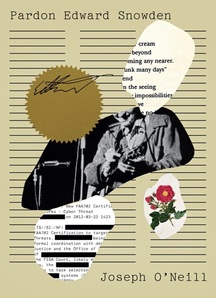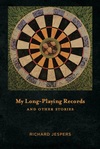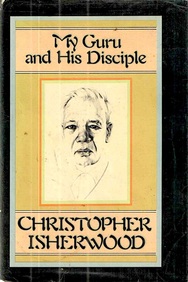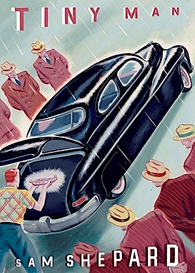A WRITER'S WIT |
New Yorker Fiction 2016
 M. Cattelan & P. Ferrari
M. Cattelan & P. Ferrari Photograph by Maurizio Cattelan and Pierpaolo Ferrari.
NEXT TIME: My Book World 2017
New Yorker Fiction 2016 M. Cattelan & P. Ferrari M. Cattelan & P. Ferrari December 19 and 26, 2016, Mariana Enríquez, “Spiderweb”: An Argentine woman travels from Buenos Aires with her husband, whom she detests, to visit family in Paraguay—a place in the “humid north” (107), where the air is difficult to breathe. ¶ This story would have one believe that ghosts appear everywhere, in this land where murders occur often, and unpleasant or even innocent people disappear. The narrator foreshadows a deadly fire when she is on an airplane and sees one the pilot claims was never there. Soldiers “put dead people in the cement” (112) of a bridge to hide bodies—there a driver has seen a woman on the bridge and hits her. One is fairly sure the narrator’s husband’s turn is coming. She’s grown to detest Juan Martín and his disagreeable ways. The narrator’s cousin Natalia doesn’t care for him either. And even though Natalia says, “‘Babe, death is the only problem without a solution,’” (109) one feels she is responsible for Juan Martín’s disappearance in the end. “‘Oh, there was a misunderstanding,’” (113) she declares to the hotel clerk, when Juan fails to appear with them at check-out time. Enríquez is the editor of Buenos Aires newspaper, Página/12. Photograph by Maurizio Cattelan and Pierpaolo Ferrari. NEXT TIME: My Book World 2017
0 Comments
New Yorker Fiction 2016 Alex Merto Alex Merto December 12, 2016, Joseph O’Neill, “Pardon Edward Snowden”: A young poet pens a poem that petitions President Obama to pardon dissident Edward Snowden. ¶ There is always a difficulty in fictionalizing pop culture or more accurately living history. Snowden’s plight has not played out completely. The light shed on Dylan’s acceptance of the Nobel Prize for poetry seems to have exploded and dimmed like a nova. O’Neill’s story really seems to be about the plight of poets: their anonymity despite a competence with and superior understanding of language that far surpass those of the most proficient prose writers. The poet Mark McCain, by way of a BCCed e-mail, is solicited by the young on-the-cusp-of-success poet, Merrill Jensen, to sign his petition. This is how the decade-older McCain responds: “He did not write Merrill back. He did not put his name to the poetition. I’ve never see utter rage portrayed more splendidly—at least as far as a spurned poet is concerned. O’Neill’s most recent novel is The Dog. Illustration by Alex Merto.  READ MY ‘BEHIND THE BOOK’ BLOG SERIES for My Long-Playing Records & Other Stories. In these posts I speak of the creative process I use to write each story. Buy a copy here! At new prices. Paper: $10.75 | £7.75 | €8.50 Kindle: $2.99 Introduction to My Long-Playing Records "My Long-Playing Records" — The Story "A Certain Kind of Mischief" "Ghost Riders" "The Best Mud" "Handy to Some" "Blight" "A Gambler's Debt" "Tales of the Millerettes" "Men at Sea" "Basketball Is Not a Drug" "Engineer" "Snarked" "Killing Lorenzo" "The Age I Am Now" "Bathed in Pink" Listen to My Long-Playing Records Podcasts: "A Certain Kind of Mischief" "The Best Mud" "Handy to Some" "Tales of the Millerettes" "Men at Sea" "My Long-Playing Records" "Basketball Is Not a Drug" "Snarked" "Killing Lorenzo" "Bathed in Pink" Also available on iTunes.
My Book WorldI'VE MADE IT MY GOAL to read the entire oeuvre of late British-American author, Christopher Isherwood, over a twelve-month period. This profile constitutes the last in a series of twenty-four. The task has taken me a bit longer than a year, but the fruits of my labor have been many. To read all the works of an author like Isherwood is to know him, as much as anyone can know a writer. To read all his works—fiction, nonfiction, dramatic, travel, diary—is to know that writers can stretch. They are not saddled with the same genre, and each experience adds depth when they return to the genres they're more comfortable with. Most of all, writers can begin in their twenties and continue to write all their lives. RJ  Isherwood, Christopher. My Guru and His Disciple. New York: Farrar, 1980. In his final book Isherwood attempts to chronicle his struggle to be an adherent of the Hindu religion. Over the many decades of study he is not always successful, and yet there are times in which he attains a certain level of satisfaction—particularly concerning his relationship with Swami, his guru. Importantly, Isherwood seems never to stop struggling, and the last two paragraphs of his book capture his feelings: “Meanwhile, my life is still beautiful to me—beautiful because of Don, because of the enduring, fascination of my efforts to describe my life experience in my writing, my fellow travelers on this journey. How I wish I were able to reassure them that all is ultimately well—particularly those who are quite certain that it isn’t; that life is meaningless and unjust! I can’t reassure them, because I can’t speak with the absolute authority of a knower. NEXT TIME: New Yorker Fiction 2016  READ MY ‘BEHIND THE BOOK’ BLOG SERIES for My Long-Playing Records & Other Stories. In these posts I speak of the creative process I use to write each story. Buy a copy here! At new prices. Paper: $10.75 | £7.75 | €8.50 Kindle: $2.99 Introduction to My Long-Playing Records "My Long-Playing Records" — The Story "A Certain Kind of Mischief" "Ghost Riders" "The Best Mud" "Handy to Some" "Blight" "A Gambler's Debt" "Tales of the Millerettes" "Men at Sea" "Basketball Is Not a Drug" "Engineer" "Snarked" "Killing Lorenzo" "The Age I Am Now" "Bathed in Pink" Listen to My Long-Playing Records Podcasts: "A Certain Kind of Mischief" "The Best Mud" "Handy to Some" "Tales of the Millerettes" "Men at Sea" "My Long-Playing Records" "Basketball Is Not a Drug" "Snarked" "Killing Lorenzo" "Bathed in Pink" Also available on iTunes.
New Yorker Fiction 2016 Ryan Heshka Ryan Heshka December 5, 2016, Sam Shepard, “Tiny Man”: A man looks back at his life in the distant past when he is a teen, and his father is miniaturized as if appearing in a diorama. ¶ The story seems to center around—in a rather impressionistic manner of dreams and memory—one or two significant events. One, the man’s father having sex with a young woman named Felicity; then the teen having sex with Felicity. The rest seems like wallpaper or atmosphere: Shepard is a master at capturing sensory details, but they seem only to serve as a conveyance for readers as they float from one scene to the next. And perhaps this move is Shepard’s intent, attempting to create for readers the same jumbled mass of memories, some of which are vivid, the others of which are faint or exaggerated—very Freudian, although the narrator makes light of such an idea: “No matter. People will talk. It could also be that I’m dreaming him like that—tiny—because it’s a way of distancing myself, but that’s a bit Freudian, don’t you think? As though there were some kind of intelligence driving all this—the subconscious or some bullshit like that. Something I find hard to believe in. Why would I want to be distanced, anyway? There’s nothing I’m still afraid of” (73) So many fathers become tiny—not because they are dead but because they are insignificant and perhaps they always were—and the author brings this idea to life. Shepard’s novel, The One Inside, comes out in February. Illustrated by Ryan Heshka.  READ MY ‘BEHIND THE BOOK’ BLOG SERIES for My Long-Playing Records & Other Stories. In these posts I speak of the creative process I use to write each story. Buy a copy here! At new prices. Paper: $10.75 | £7.75 | €8.50 Kindle: $2.99 Introduction to My Long-Playing Records "My Long-Playing Records" — The Story "A Certain Kind of Mischief" "Ghost Riders" "The Best Mud" "Handy to Some" "Blight" "A Gambler's Debt" "Tales of the Millerettes" "Men at Sea" "Basketball Is Not a Drug" "Engineer" "Snarked" "Killing Lorenzo" "The Age I Am Now" "Bathed in Pink" Listen to My Long-Playing Records Podcasts: "A Certain Kind of Mischief" "The Best Mud" "Handy to Some" "Tales of the Millerettes" "Men at Sea" "My Long-Playing Records" "Basketball Is Not a Drug" "Snarked" "Killing Lorenzo" "Bathed in Pink" Also available on iTunes. |
AUTHOR
Richard Jespers is a writer living in Lubbock, Texas, USA. See my profile at Author Central:
http://amazon.com/author/rjespers Archives
June 2024
Categories
All
Blogroll
Websites
|